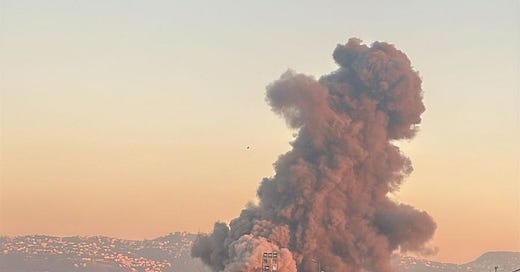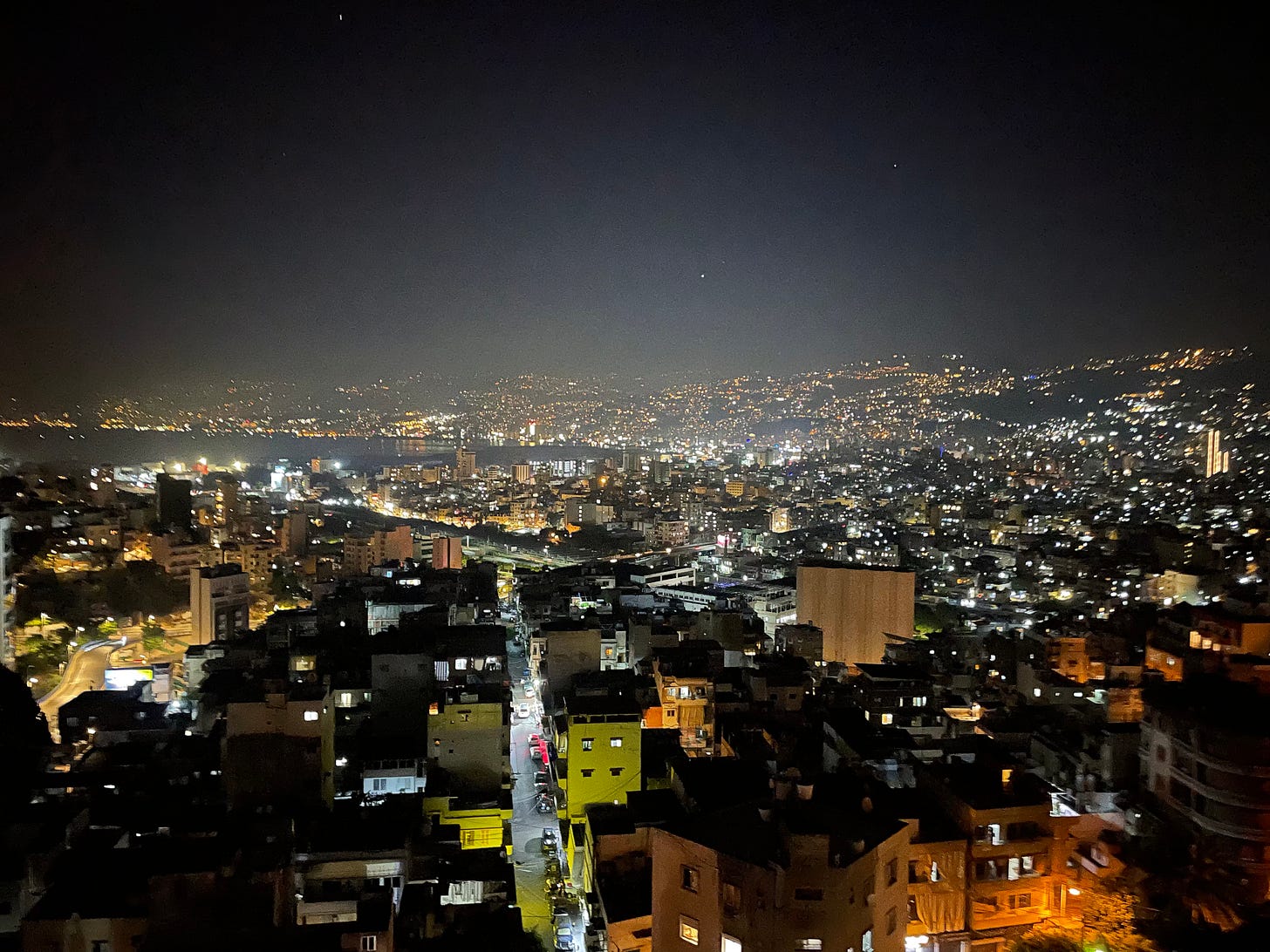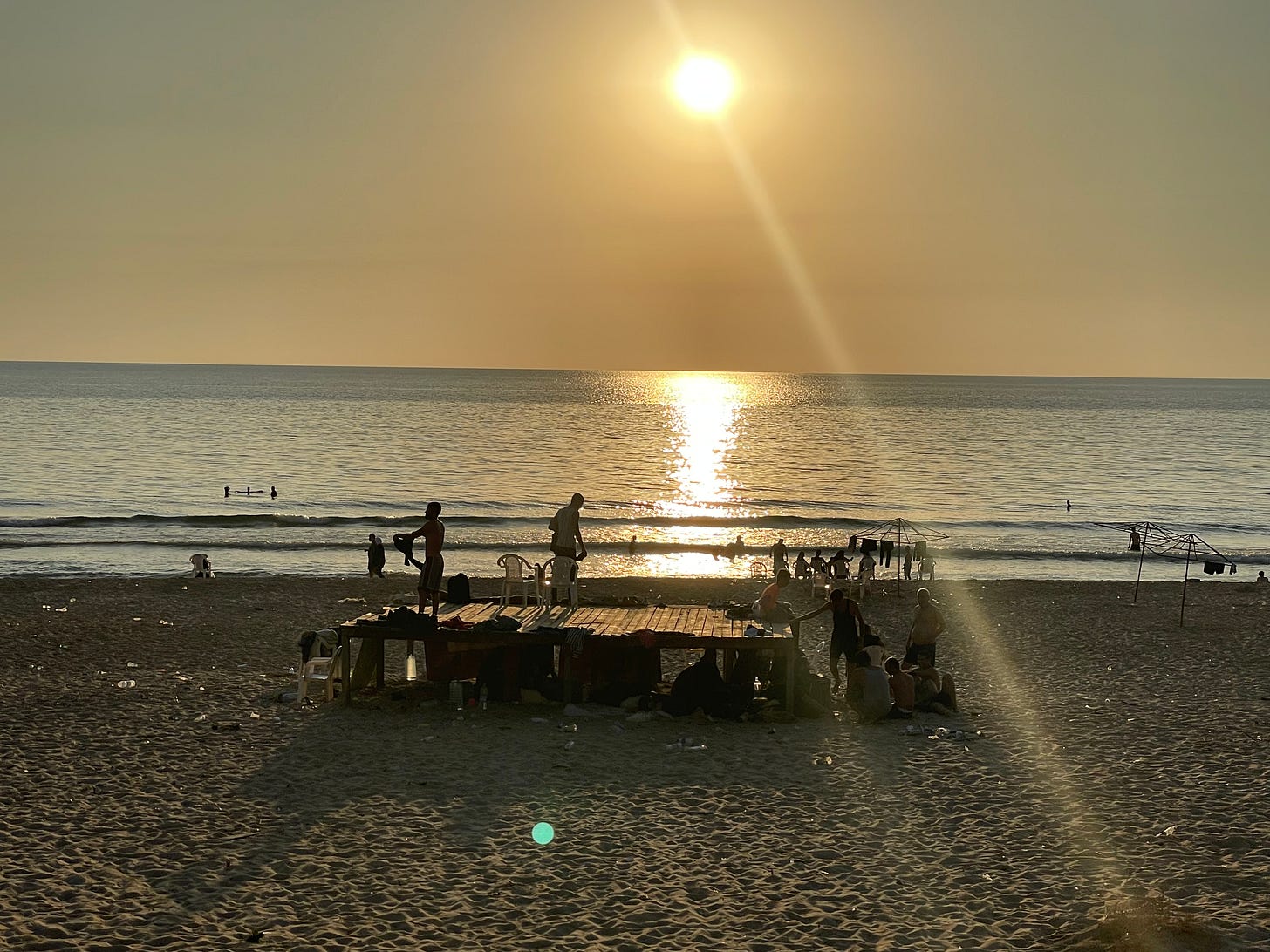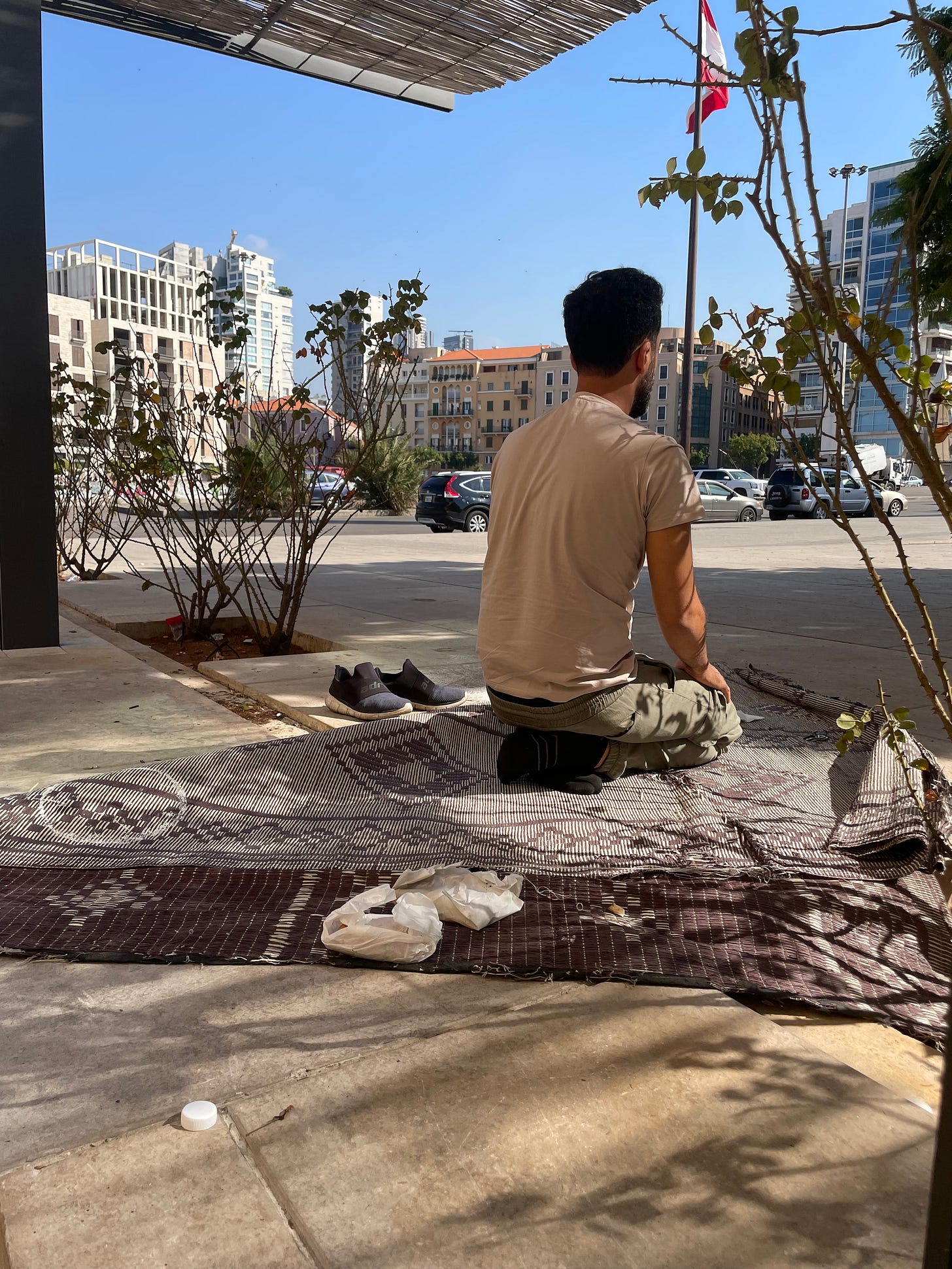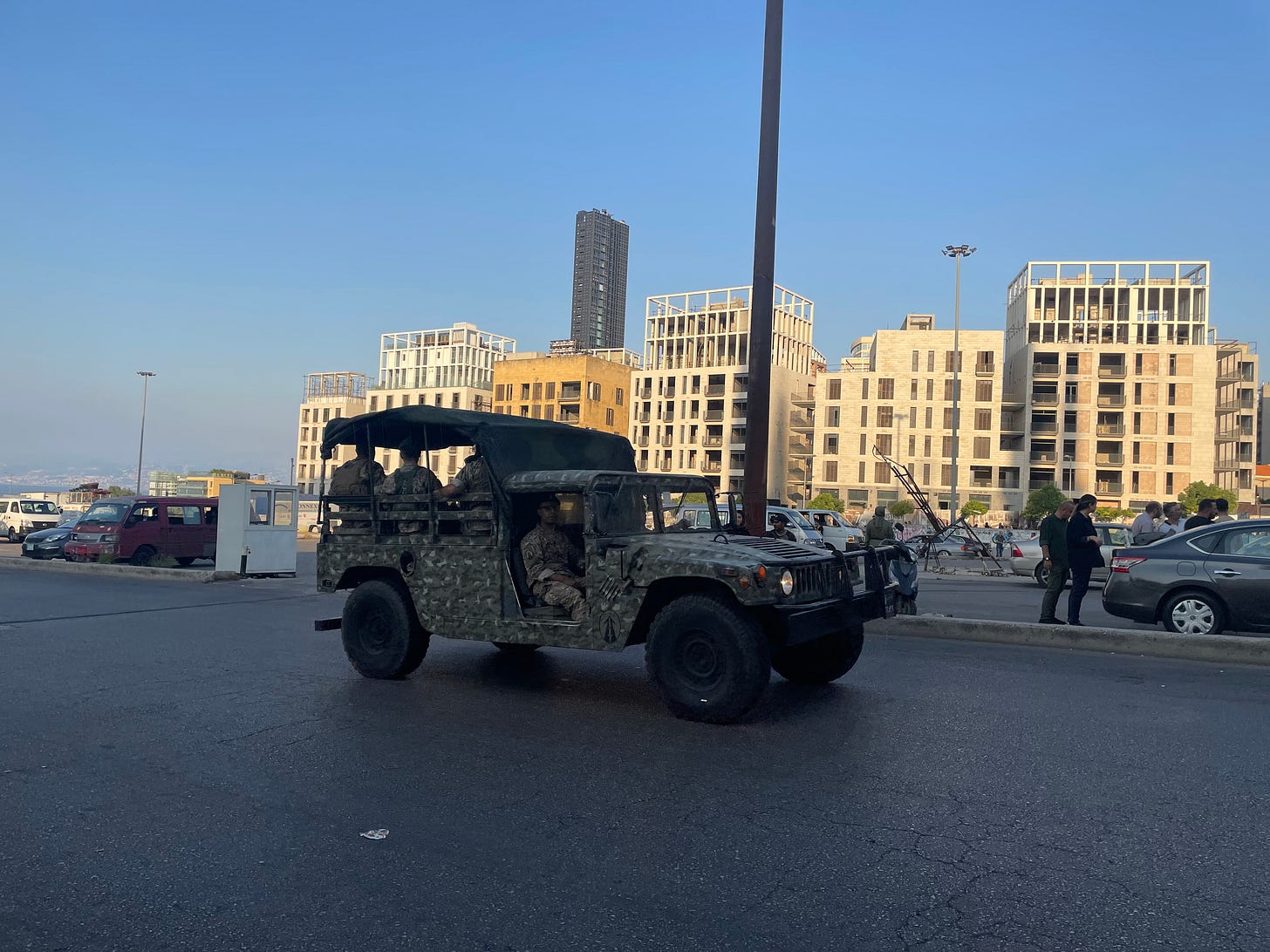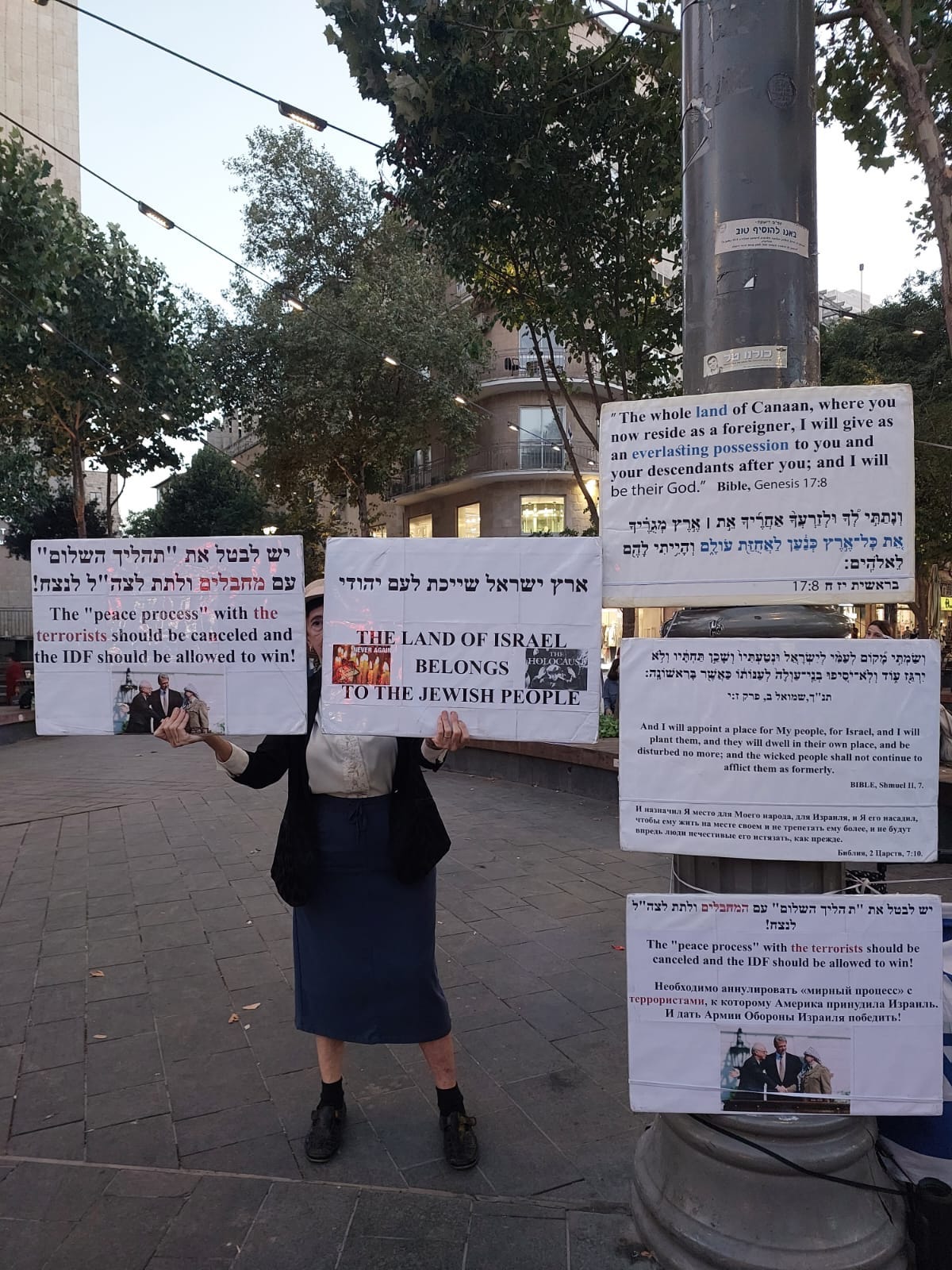Some photos and words from the weekend Beirut learnt Hassan Nasrallah died
On Friday evening, Israeli jets dropped as many as 80 bombs on south Beirut, levelling around 6 multi-storey buildings in the densely populated residential neighbourhood of Haret Hreik. The target was Hassan Nasrallah, who had led the paramilitary group Hezbollah for the last 32-years.
Newlines wrote: “For both foes and followers, Nasrallah was larger than life, occupying a place in the Arab world that rivals the mythic aura of Egypt’s Gamal Abdel Nasser. Nasser’s legacy was one of pan-Arab nationalism. He was a unifying figure across the region. Nasrallah, by contrast, operated from within a Shiite-Islamist framework, one tied tightly to Iran, though his influence often crossed sectarian lines. His death strikes at the heart of an entire axis of regional power, creating ripple effects that will not easily be contained.”
As Friday night progressed, more neighbourhoods in south Beirut - both a Hezbollah strong hold and home to tens of thousands of predominantly Lebanese Shia - were told to evacuate. Severals trikes hit the area soon after.
As night fell, many people from the southern suburbs known as Dahiyeh walked or piled into cars and scrambled to other parts of Beirut.
Some slept on the beach or on the sidewalks as missiles struck at their home neighbourhood a few miles away. Other families found spaces in schools that had been converted to shelters.
Dazed looking families with young children slept in doorways and in a small park near Martyrs Square, looking for any shade they can find from the sun. Mothers sat on concrete pavements breastfeeding and elderly people rested their walking sticks as they sit on a rugs lain under the shade of a tree. Two children from Dahiyeh fled with their pet parrot with them.
At around 2.30pm on Saturday, on the Hezbollah affiliated al-Manar channel, the party announced that "the master of resistance," Hassan Nasrallah, "has moved alongside his Lord as a great martyr."
At Martyrs Square, some screamed while others began praying, as word that Hezbollah had confirmed the death of its leader Hassan Nasrallah spread among the displaced Lebanese who had flocked to Martyrs Square for safety.
“He's a mythical figure that changed the course of history. Fearless, uncompromising and faithful to his cause. He lived his life fully, accomplished his duty and left behind him a great legacy. He will be remembered for generations to come,” one Lebanese Shia man told me.
As news spread that Hezbollah had confirmed Hassan Nasrallah’s death, a large military convoy drove through Martyrs Square while money exchanges and many businesses closed down, some in mourning and some in fear of unrest later that evening.
I took part in a radio discussion on Sunday on Monocle about the fallout from Nasrallah’s death with several other journalists and commentators. You can listen to it here.
Even after Nasrallah’s death, the strikes continued on south Beirut, the eastern Bekaa valley and south Beirut.
In Jerusalem, a friend sent me a photo with a woman holding a poster saying: "The 'peace process' with the terrorists should be cancelled and the IDF should be allowed to win!"
I spoke with other Israeli about how their viewed military actions in Lebanon for iNews. I’ve copied out the piece below.
Some piece worth your time this week:
Israelis on military action in Lebanon
Prime Minister Benjamin Netanyahu said he would continue to “strike Hezbollah with full force”. Israel has rejected proposals for a ceasefire, defying allies such as the US, UK and others who had called for a 21 day pause in fighting to allow diplomatic efforts to prevail.
Inside Israel, support for military activity remains strong, with polling data published in August by the Israel Democracy Institute, a Jerusalem think tank, showing 67 percent of respondents thought Israel should intensify its response to Hezbollah.
This figure included 47 percent of Jewish respondents who believed that Israel should launch a deep offensive striking Lebanese infrastructure, and 27 percent who supported an intensified response that avoids striking Hezbollah infrastructure.
Earlier this week, Israel’s military chief said the country was preparing for a possible ground invasion after a week of intense exchanges between Hezbollah in Lebanon and Israeli forces.
During a visit to troops in northern Israel, Maj Gen Herzi Halevi, said: “We are preparing the process of a manoeuvre, which means your military boots, your manoeuvring boots, will enter enemy territory.”
However despite analyst fears the escalation could lead to changes in Israel’s nuclear doctrine, people on the ground told i any suggestion of nuclear activity is not taken seriously.
Nevo Spiegel, a research fellow at Molad, a left-leaning Israeli think tank says anyone in Israel suggesting use of nuclear weapons is taken “with a minimal grain of seriousness.”
“I think there’s an appetite for an aerial campaign but not sure much for ground invasion. Some on the right think it’s a necessity but most view it as a dangerous move,” he said.
Malcolm Gafson, a resident of Ra’anana, an Israeli city which lies north of Tel Aviv, says that after a year of aerial strikes from Hezbollah towards northern Israel there is a “strong and wide” consensus in Israel that the Israeli military response towards the Iran-backed paramilitary group in Lebanon should be “intensive.”
He believes this could include “boots on the ground” but says the aim of the campaign should be returning the 60,000 displaced people home to northern Israel.
Gafson says he wants the threat of Hezbollah to be removed and the group’s militants moved away from the border area to north of the Litani river, 28 km from The Blue Line that currently demarcates Lebanese and Israeli territory.
Sarit Zehavi, a resident of northern Israel and the president of Alma, a research centre that focuses on Israel’s security, told i no one suggesting the use of nuclear weapons against Hezbollah is taken seriously in the country.
That’s despite previous comments from US Senator Lindsey Graham that Israel should do “whatever” it takes “to end the war” made in reference to the US dropping atomic bombs on Japan.
Israeli Heritage Minister, Amihai Eliyahu, also sparked outcry in November last year after suggesting dropping a nuclear bomb on the Gaza Strip was “one of the possibilities”. He was quickly suspended from Cabinet meetings by Prime Minister Benjamin Netanyahu who said the comments were not “based in reality”.
The Israeli Defence Force said it is “operating in accordance with the highest standards of international law to avoid harming innocents.”
Speaking 12 kilometres from the Israel-Lebanese border where Zehavi says fires have broken out due to strikes from Hezbollah, she said “the feeling is that the international community is not enabling us to win.”
She said Israel needs a diplomatic arrangement as it “cannot continue fighting all the time.” However she believes if Israel wants to pressure Hezbollah it cannot just cease fire and expect that the group will agree to all of Israel’s demands.
“If we cease fire now for 21 days, it will be much more difficult for us to gain any military achievements in Lebanon,” she says, citing Hezbollah’s ability to recover from the damage inflicted on it from an intensive wave of Israeli strikes over the last week and the extra time it will have to prepare for an Israeli operation in south Lebanon during a three-week ceasefire.
She said Israel should continue its campaign against Hezbollah while negotiations are underway. If there is a ground invasion, it should be “quick and temporary” and Israel should not “repeat its past mistakes” in Lebanon.
Zehavi says it’s also important for there to be an “effective monitoring mechanism” for any agreement between Hezbollah and Israel.
“Whether it’s the United States or Britain or France or UAE it doesn’t matter” she said, adding she wouldn’t support a state like Qatar having a monitoring role.

